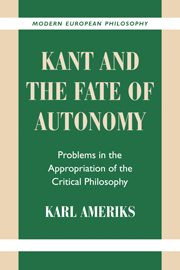Book contents
6 - Hegel's Critique of Kant's Theoretical Philosophy
Published online by Cambridge University Press: 05 June 2012
Summary
Pre-Hegelian Prologue
Given the preceding investigations, the inevitable next question is: How did German philosophy proceed right after Fichte's innovations? For the most part, I have compared Fichte not with his immediate successors but with interpreters and like-minded philosophers of our own time. This was a response to the fact that the general philosophical orientation that Fichte took over from Reinhold has recently enjoyed a very significant growth in popularity. Even philosophers who have a fairly casual understanding of Kant are still tempted, for example, by the notion of making idealism more attractive by using something like the “short argument” that Reinhold introduced and that Fichte took over in his own way (see above Chapter 3). Similarly, there has been a tendency to follow Reinhold and Fichte's move of making the notion of apperception absolutely central, and of emphasizing aspects of it that have little to do directly with Kant's own understanding of apperception – which is dependent on the notion of specific forms of judgment and the capacity to provide what are first of all general principles for objects of experience rather than specific insights into self-consciousness or our absolute freedom (see above Chapter 5). Both of these moves radicalize the notion of autonomy by suggesting a philosphical program that uses the bare notion of human thought as such as a sufficient foundation for determining the basic structures of all meaningful reality.
- Type
- Chapter
- Information
- Kant and the Fate of AutonomyProblems in the Appropriation of the Critical Philosophy, pp. 267 - 308Publisher: Cambridge University PressPrint publication year: 2000
- 1
- Cited by

